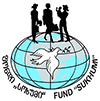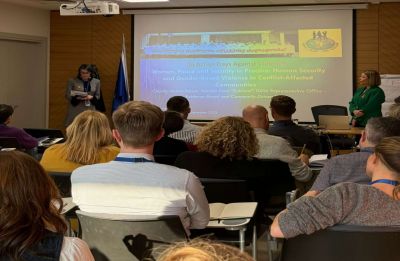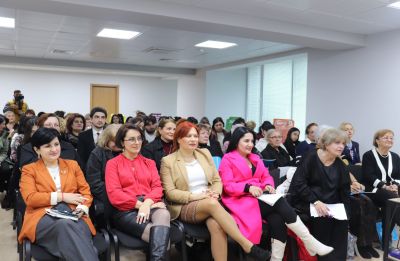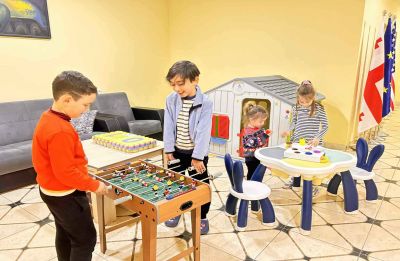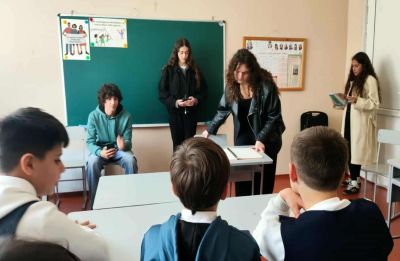The forum - theater has an unusual period now - it has temporarily lost its audience, but it has moved to the social network and even more people see its activity.
The forum - theater joined the campaign of "16 active days against violence towards the women." The Facebook page of the Fund “Sukhumi” presents: videos on the topic of domestic violence and the covid pandemic, chronicles of three generations of theater, photo collage of shadow - theater, five-minutes of poetry ......
Before meeting the audience directly, the forum theater is active on the Internet ...





In October, forum-theater is actively working on new performances, rehearsals and dialogues are being prepared. This process also includes a group of volunteers.
Performances are held in the city parks. Due to the pandemic, the number of viewers has decreased, but interest is shown. Passers-by encourage young actors: "Don't relax, you are serving the right issues!"
The pandemic has taught actors to have video footage in order to communicate with viewers via the Internet. Now that they are acting based on these lessons learned, preparing videos, recording performances ...






In September, the open-air forum theater performances started actively. Due to the current situation, there are few spectators, but the performances are still held. A new initiative of the forum theater - interviews with citizens, people of different generations. The conversation is about the causes of violence, the results, the way out of the situation.“Theater of one spectator”, is also played there, which is very impressionable for everyone.





Another hot summer season in the history of the forum - theater is over. Young actors held performances in the open air, in the Central Park of Kutaisi, in the Park of Love.
A new season will begin on September 15 - there will be trips to the regions where the forum-theater performances will be held on current topics: violence, bullying, family relations, etc.





Forum-theater of the Fund "Sukhumi" actively continues to work during the hot days of summer - new scenarios are created, rehearsals are held, personal videos and monologues are posted on the Facebook page.
And one more thing: a new rubric "Date with Rioni" (this is the name of the river in Kutaisi) has begun, which is still under development.
Forum theater is and still remains the most original activity.






Forum Theater is one of the most popular components in the project “Strengthening of Women's Rights in Western Georgia”.
In June, rehearsals in the office resumed, new scenes were prepared. It is still not possible to conduct performances in the open air, so activity on the social network was continued: personal videos, monologues, stories of victims of violence — 32 activities are presented on the Facebook page of the Fund “Sukhumi”.




The online work of the forum theater is active and creative. Instead of halls and open-air scenes, now its new space is the Facebook page of the Fund “Sukhumi”!
Interesting activities are being carried out: archived materials of the forum theater and shadow theater are being updated, photo collages, videos, slogans, and literary presentations are being made. Actors of the forum theater and director Magdana Chikhladze read poems and monologues of women victims of violence. Sometimes young people try to amuse readers and with their humorous videos show how they have fun at home!
30 online activities in May - is a pretty big job. Forum-theater gained a lot of experience during quarantine - teenagers did everything on their own.



Forum Theater has a long and interesting history. Now, in the period of quarantine, it has a new challenge - how to work without an audience?
But there was a solution - the audience is the Facebook page of the Fund “Sukhumi”, which has more than 3,000 subscribers - https://www.facebook.com/fsokhumi/.
The young actors have interesting initiatives. And with the help of director Magdana Chikhladze, April became a special month in the life of the forum theater: archive records, films, TV programs appeared on the Internet, it was added with actors’ video appeals regarding the pandemic, photo collages, dialogs from different scenes.
Also the video messages from the previous generation of forum theater actors and the first director Kote Revishvili was very interesting, now he works in France - these successful people openly talk about the role of the forum theater and its impact on their lives.
All this is very impressive and original. So the online mode of the forum-theater is very active.



The forum-theater performances were held in Khoni municipality: in public school No. 4 and in the school of the village Namashevi. The most active discussion was held regarding the scenes of Sweethearts, as well as mother and son.
The audience talked about the problems of domestic violence, migration, drug addiction and early marriage. The performances of the forum - theater showed them everyday reality and made them think about ways out.




Performances of the Fund “Sukhumi” Shadow Theater were held in kindergartens No. 10 and 11. Children watched the fairy tale "Turnip" with great interest and pleasure. They liked the characters, saw how they help each other...After completion of the performance, the children shared their emotions and impressions...
